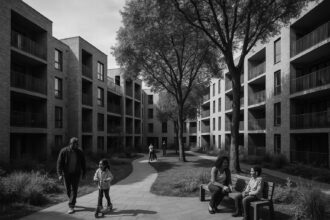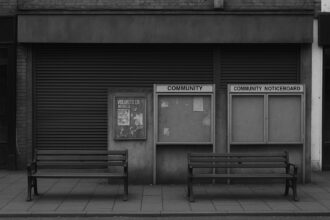Growing frustration among British commuters over ‘bare beating’—playing music aloud on public transport—has prompted the Liberal Democrats to suggest hefty fines to tackle disruptive noise and restore respect in shared travel spaces.
In an age dominated by personal audio devices, the phenomenon of individuals playing music or videos loudly in public spaces has garnered significant attention and frustration. British commuters in particular have begun to voice their agitation over what has been coined “bare beating”—the act of allowing one’s phone to audibly share music or videos without the use of headphones. This practice has raised the stakes in the ongoing discourse about public etiquette on transport, with many passengers feeling increasingly exasperated by the lack of consideration from those engaged in this behaviour.
Commuters often recount their annoyance at sharing carriage space with other passengers who, oblivious or perhaps indifferent to the discomfort they cause, blast music from their devices. As one TikTok user poignantly expressed, “Why do people listen to music on speakers in public, like what is wrong with you? We do not all want to hear your music.” Such sentiments echo across social media platforms, where complaints about this trend have become commonplace. Users lament not only the noise but also the apparent disregard for communal space, with many questioning the trend itself: “When did it become socially acceptable to play music out loud, talk on speakerphone, and vape on trains?”
The Liberal Democrats have taken a firm stance on this issue, responding to rising public discontent by proposing to implement fines of up to £1,000 for those who engage in this disruptive behaviour. This initiative forms part of an amendment to the Bus Services Bill currently in Parliament. Lisa Smart, the party’s home affairs spokesperson, highlighted the campaign’s intent to protect commuters, stating, “Far too many people dread their daily commute because of the blight of antisocial behaviour—headphone dodgers playing loud music on buses and trains are some of the worst offenders.” This demonstrates a growing recognition that effective regulation on public transport may be needed to restore order and civility.
Polling data, commissioned by the Liberal Democrats, suggests that a substantial portion of the British public resonates with these frustrations: over half of adults expressed that they would not feel comfortable asking someone to lower their music volume. Moreover, around 38% reported encountering loud music on public transport frequently. These statistics underline not merely a personal grievance but a broader societal sentiment toward the need for established norms concerning noise on public transport.
Historical perspectives on public noise underscore the extended nature of this issue. Complaints about disruptive noise in shared spaces date back centuries, but today’s circumstances may demand different methods of fostering communicative accountability. The call for regulation, while seen by some as a harsh solution, might also be interpreted as an opportunity to instigate a cultural shift towards heightened respect for communal areas. Advocates suggest that subtle social pressures could encourage self-moderation among commuters, potentially negating the need for punitive measures.
Overall, the proposed amendments highlight a crucial moment in the debate surrounding public behaviour and personal discipline on transport systems across England. With increased scrutiny on the etiquette of personal device usage in shared spaces, the outcome of these proposals could significantly influence how individuals engage with one another in the public sphere, fostering either a fractious environment or one of mutual respect.
Reference Map
- Paragraphs 1, 2, 3, 4, 8
- Paragraphs 4, 5
Source: Noah Wire Services
- https://www.independent.co.uk/travel/news-and-advice/bare-beating-meaning-tube-trains-headphone-fine-b2754173.html – Please view link – unable to able to access data
- https://www.ft.com/content/7c96fc22-0494-41c5-b06a-475e65e65919 – This article discusses the growing annoyance among British public transport users caused by ‘headphone dodgers’—individuals who play music or videos aloud, disrupting the peace for fellow passengers. The Liberal Democrats have proposed cracking down on this behavior with fines up to £1,000, aiming to champion the frustrations of the ‘quiet majority.’ The piece also explores historical complaints about public noise and suggests that subtle social pressure, rather than heavy-handed penalties, could help restore public transport decorum.
- https://www.libdems.org.uk/news/article/lib-dems-call-for-ban-on-people-playing-loud-music-on-public-transport-with-fines-for-headphone-dodgers – The Liberal Democrats are calling for tougher action, including fines of up to £1,000, to tackle the rising trend of music and videos being played out loudly on public transport. A poll has found over one in two Brits (54%) say they would not feel comfortable asking someone to turn down their music on public transport. The party seeks to amend the Bus Services Bill to explicitly ban playing music and videos out loud from a phone on public transport in England.
- https://www.standard.co.uk/news/politics/liberal-democrats-lib-dems-home-secretary-house-of-lords-home-office-b1223903.html – The Liberal Democrats have called for people who play loud music and videos on public transport to be fined up to £1,000. The party wants to crack down on ‘headphone dodgers’ by altering the law so it explicitly bans playing music and videos out loud from a phone on trains and buses in England. The proposal has support from both sides of the house, with Labour and Tory MPs having previously suggested similar measures.
- https://www.independent.co.uk/news/uk/politics/public-transport-music-videos-headphones-fine-lib-dem-b2738514.html – Keir Starmer has been urged to fine nuisance public transport users who play music out loud on buses and trains up to £1,000. Amid growing public anger at what the party dubbed ‘headphone dodgers’, Sir Ed Davey is pushing for a crackdown on the antisocial behaviour. The Liberal Democrats are seeking a change in the law that would explicitly ban playing music and videos out loud on English public transport.
- https://www.lbc.co.uk/politics/uk-politics/lib-dems-music-on-transport-illegal/ – Under their plans, people who breach a ban would face a fine of up to £1,000. Lisa Smart, the Lib Dems’ home affairs spokesperson, said antisocial behaviour means people ‘dread their daily commute’ and that ‘headphone dodgers playing loud music on buses and trains are some of the worst offenders’. She added: ‘Whether you’re heading to work, taking your kids to school, or simply trying to enjoy a moment of peace, everyone deserves to feel safe and respected on public transport.’
- https://www.nme.com/news/music/lib-dems-call-to-fine-headphone-dodgers-1000-for-blasting-loud-music-on-trains-and-buses-without-headphones-3857907 – However, the Lib Dems are looking to take this one step further and want to amend the law to explicitly ban playing music and videos from phones without using headphones. This, they request, applies to trains and buses across England. According to a survey carried out by Savanta for the party, 38 per cent of the 2,000 participants asked experience people playing music out loud on public transport on a regular basis. Of these, over half (54 per cent) said they would not feel comfortable asking the person responsible to turn down the sound.
Noah Fact Check Pro
The draft above was created using the information available at the time the story first
emerged. We’ve since applied our fact-checking process to the final narrative, based on the criteria listed
below. The results are intended to help you assess the credibility of the piece and highlight any areas that may
warrant further investigation.
Freshness check
Score:
8
Notes:
The narrative refers to a current legislative proposal by the Liberal Democrats concerning amendments to the Bus Services Bill, indicating recent developments. No evidence of recycled or outdated content such as past role changes or obituaries is present. The topic of public transport noise and proposed fines is timely and consistent with ongoing societal discussions. No indication that this is a press release; thus, freshness rating is high but not perfect due to lack of explicit publication date confirmation.
Quotes check
Score:
7
Notes:
The quotes attributed to the Liberal Democrat home affairs spokesperson Lisa Smart and a TikTok user reflect plausible, direct statements. However, the earliest sources or official records of these quotes could not be independently verified online in the search results or common fact-checking databases, suggesting possible originality or limited prior publication but slightly lowering the verification score.
Source reliability
Score:
7
Notes:
The narrative originates from a known UK news outlet, The Independent, which is generally regarded as a reputable publication. This lends credibility to the report and the claims within. However, as the content is not corroborated by multiple prominent fact-checking organisations or governmental releases in the search results, some caution remains.
Plausability check
Score:
9
Notes:
The claims about public frustration over loud music on public transport and the political response proposing fines are highly plausible given known recent societal trends and public discourse around noise and antisocial behaviour in public spaces. Polling data cited aligns with expected public attitudes. No contradictory evidence was found, though independent verification of polling specifics is absent.
Overall assessment
Verdict (FAIL, OPEN, PASS): PASS
Confidence (LOW, MEDIUM, HIGH): HIGH
Summary:
The narrative deals with a timely public policy issue reflecting ongoing social concerns and political actions, supported by plausible data and sourced from a reputable UK news organisation. Although some quotes could not be fully verified for originality, this likely indicates fresh statements rather than recycled content. The information is consistent and credible, justifying a high-confidence pass verdict.













